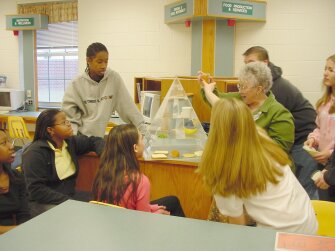So what do you want to be when you grow up?
It’s the question grownups ask little kids and it’s a question that I ask my sixth graders who are taking their first Career and Technical Education course. The top unisex answer these days is forensic scientist. A lot of girls are interested in becoming pediatricians and marine biologists with a smattering of fashion designers and actresses thrown in. I almost always have a couple of boys who want to go into the military and a few who are interested in becoming video game designers, but the vast majority of twelve year old boys plan on a career as professional athletes.
I always gently suggest that it might be a good idea to have a backup plan just in case they don’t make it to the pros. I remind them that in twenty-three years of teaching, I’ve only had one student make it as a professional athlete--Colorado Rockie’s pitcher John Maine. Well, as Friday, that has changed. See the boy with the braids in the gray sweatshirt?

That’s Torrey Smith and he’s just been drafted as a wide receiver by the Baltimore Ravens.
Torrey epitomizes the Horatio Alger athletic success story. His mom was 16 when he was born. During his middle school years the family struggled. We knew that times were hard and that Torrey was helping a lot with his younger siblings. Torrey could have been angry and resentful about his circumstances. But he wasn’t. He was popular, good looking and a good athlete, so he could have been cocky and full of himself. But he wasn’t. He may have been only an average student, but Torrey was impressive in that he was modest, polite, and hardworking.
That has not changed. He got the full ride athletic scholarship to the University of Maryland where he was a star. But he didn’t let it go to his head. He trained hard, doesn’t touch drugs or alcohol, finished his degree in criminology, and kept close to his mom and siblings, even when he had to be the grown-up. Despite the hard times and difficulties, Torrey claims,
I wouldn't change anything in my childhood for the better. I like every struggle I have been through. I have learned from it. It helped make me a better person. It is tough for me to break mentally.
There is another consistent pattern in Torrey’s life. All along they way, coaches and school communities supported and mentored him. Every coach who has worked with him mentions his work ethic, positive attitude and personal humility. But it’s interesting that even as they talk about his accomplishments, they model those values they highlight and claim no credit for his success.
I’ve added some more pictures of Torrey to the space where I put articles or pictures of former students. Now when my sixth graders say they want to grow up to be a pro athlete, I point to pictures and tell them that it can come true with hard work. But I also point out that Torrey said
It's been long journey on and off, the field. I've reached one of my life time goals, graduating from college. You can take away the records I've broken as a receiver, but you know, my diploma, you can't take that away from me.
This afternoon I was looking at those pictures and I wondered:
- Do we overestimate or underestimate the value of extra-curricular activities in shaping a student’s future success?
- Why are some kids able to overcome so much and come so far when others seem to flounder in spite of stable homes and secure families?
- Is character innate or is it learned behavior?
- Can optimism, humility, and persistence be taught?
- Where is the delicate balance between coaching and mentoring our students and imposing our own values on them?
- In the end, which will matter more-- the content we teach, or the values of concern, community, character, and compassion that we model?